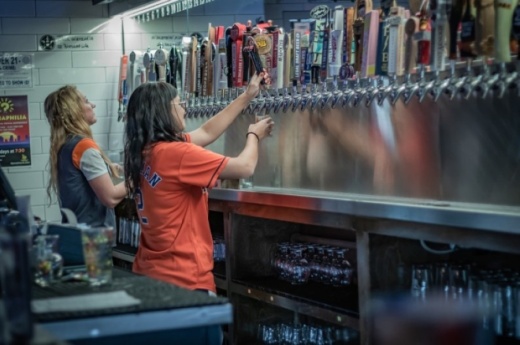The executive order from Abbott states that establishments that make more than 51% of their revenue from alcohol sales had to close at noon June 29.
Andrew Neidert, owner of Tapped DraftHouse & Kitchen of Conroe and Spring, said he was able to remain open, albeit at a more limited capacity.
"We're classified as a restaurant because we do more in food sales than we do in alcohol sales," Neidert said. "I've noticed a huge impact just over the weekend. Less people are out and about, so there is a decrease in sales. This weekend, we were down about 50% in sales, even from Father's Day weekend."
While operating at a limited capacity, Neidert said things have been slowly starting to trend in the right direction for his restaurant, as sales were down around 20% for June compared to being down 80%-85% in March when dine-in was prohibited and stay-at-home orders were more strictly in effect.
"We haven't been worried about turning people away due to the 50% [dine-in] restrictions, which is a good thing and a bad thing, depending on how you look at it," Neidert said. "I think people are favoring more of the shelter-in-place with everything going on."
Scott Spann, vice president of hospitality for Howard Hughes Corp., said Como Social Club was among the bars affected in The Woodlands area. The bar also operates as a live music venue, which had just released a list of performers when the closure went into effect.
"Once we receive direction that bars are able to reopen, we will be ready to greet guests with the cocktails and live music that they enjoy so much," Spann said.
Other bars across the state, however, are suing Abbott due to the closure. Currently, no bar owners in The Woodlands are among the 30 in the lawsuit.
JJ Hollie, president and CEO of The Woodlands Area Chamber of Commerce, said the closures are going to be damaging to the local hospitality businesses.
"[They] have really taken the brunt of this slowdown," Hollie said. "But you can't ignore that we have this dramatic rise of coronavirus cases, and we need to do what we can to control the spread."
Hollie added in the short time bars were able to be open, he had heard of some that had actually recovered the lost revenue from the closure. However, while they were open, Hollie said, some bars were having trouble getting employees to come in due to concerns of coronavirus and unemployment benefits.
Hollie said the chamber is still providing every resource that it can to its members and is advocating for members to elected officials with regard to the effect the shutdown is having on them.





